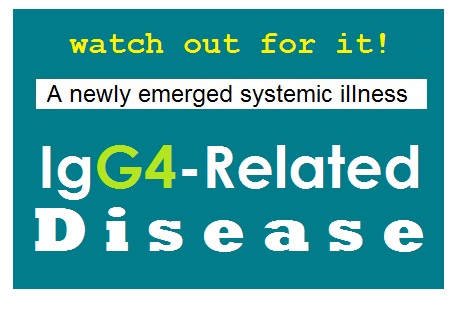Immunoglobulin G4 (IgG4)-related disease is a chronic inflammatory condition recognized as a systemic disease recently. It is characterized by dense infiltrates of lymphocytes and IgG4-secreting plasma cells in different tissues in the body. IgG4-RD is associated with an increased level of IgG4 in the blood in about 60-70% of cases especially during the acute phase.
The exact mechanism by which the IgG4-RD occurs is poorly understood. However, it has been postulated to be an autoimmune in nature. This condition could affect any organs in the body. The many faces of IgG4-RD requires that all health care professionals to get to know this newly proposed clinical-pathologic entity.
IgG4-RD has a relapsing-remitting nature associated with a tendency to form a destructive mass in the affected organs. In fact, the initial inflammatory infiltrates will be replaced by fibrotic lesions followed by forming pseudo-tumors in the affected organs, often leading to biopsy or excision for fear of true malignancy.
Several different diseases that have been known in medicine for many years are now considered to be the manifestations of IgG4-RD. This disease could affect one or multiple sites in the body such as salivary glands, thyroid, kidneys, pancreas, lungs, bile ducts, eyes, sinuses, mediastinum, skin, nerves, lacrimal and pituitary glands, prostate and cardiovascular system. Interestingly, IgG4-RD does not have much musculoskeletal involvements and manifestations.
There are no specific criteria to diagnose IgG4-RD clinically, and its definitive diagnosis requires histopathologic analysis. However, an increase in inflammatory markers in the blood and an elevation of IgG4 should make a health practitioner be suspicious of this culprit!
Once it is correctly diagnosed, IgG4-RD responds well to corticosteroid therapy. Natural adjuvant therapies for this disease are chelation of heavy metals, anti-inflammatory diets and immunity-targeted nutraceuticals.
Abazar Habibinia, MD, DFN
Executive Director of the Canadian Academy of Sports Nutrition



